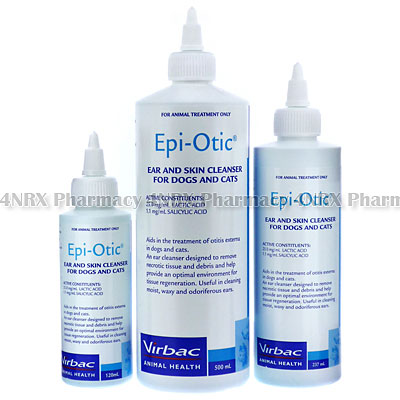 |
Home  4NRX Pet Pharmacy 4NRX Pet Pharmacy  Epi-Otic Ear and Skin Cleanser (Lactic Acid/Salicylic Acid) Epi-Otic Ear and Skin Cleanser (Lactic Acid/Salicylic Acid) |
|
|||||||||
|
|
Epi-Otic Ear and Skin Cleanser (Lactic Acid/Salicylic Acid)
What is Epi-Otic Ear and Skin Cleanser (Lactic Acid/Salicylic Acid) used for? Epi-Otic Ear and Skin Cleanser (Lactic Acid/Salicylic Acid) is an ear cleanser used in combination with antibiotic medications to treat outer ear infections affectings dogs or cats. It works by cleaning and drying the ear canals while removing excess dirt, wax, and crusty build up. Your veterinarian may also prescribe it for other unlisted purposes. How should I use Epi-Otic Ear and Skin Cleanser (Lactic Acid/Salicylic Acid)? Epi-Otic Ear and Skin Cleanser (Lactic Acid/Salicylic Acid) should be used according to your veterinarian's instructions and those included on the bottle to ensure the safest and most effective results. The solution is normally applied before using antibiotic ear drops to remove dirt and buildup. Apply a small amount of the cleanser to the ear being treated and use a damp cloth or clean cotton pad to wipe away any dirt or wax from the ear. Ask your veterinarian any questions you have about the medicine to make sure you are using it correctly. What are the side effects of Epi-Otic Ear and Skin Cleanser (Lactic Acid/Salicylic Acid)? Epi-Otic Ear and Skin Cleanser (Lactic Acid/Salicylic Acid) will not cause side effects in most pets when applied correctly. Stop using the cleanser and contact your veterinarian if you notice any unusual symptoms such as swelling or redness of the ear, discharge from the ear, or signs of an allergic reaction such as skin rashes, swelling, or difficulty breathing to make sure any necessary alterations are made to its treatment to prevent more problems from occurring. Please Note Epi-Otic Ear and Skin Cleanser (Lactic Acid/Salicylic Acid) is only meant for external use in dogs or cats and should not be administered to humans. Strictly follow all instructions provided to you by the prescribing vet while using Epi-Otic Ear and Skin Cleanser (Lactic Acid/Salicylic Acid) on your animal. Optimum and safe dosage can differ based on the animal and the condition it is being treated for. As this medication may be unsafe for certain animals, it is essential you always inform the vet if your animal is used for breeding and is pregnant or lactating, as well as if it has any allergies, other illnesses, or ongoing health conditions, and if it is being given any other form of medication, supplements, or herbal products. Immediately seek emergency veterinary care if your animal has any allergic or hypersensitive reaction. Common signs of a reaction in animals include hives, swelling, skin rashes, chest pains, as well as trouble breathing or swallowing. 
|
||||||||||||||||||||||